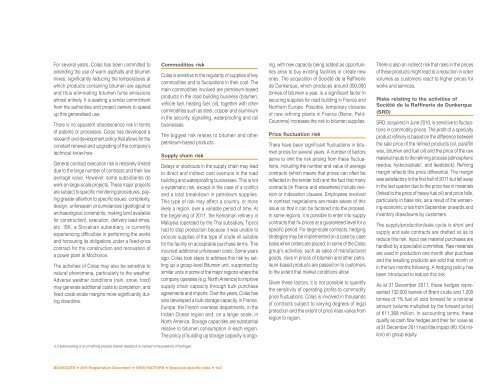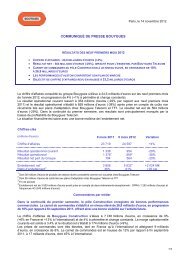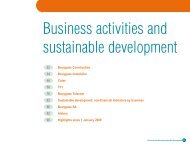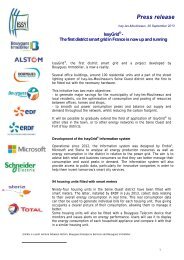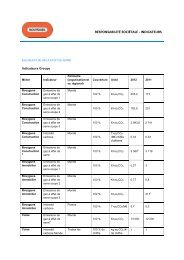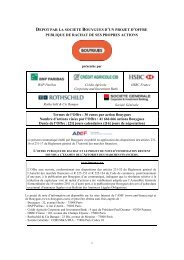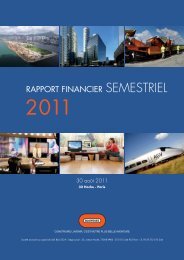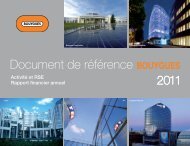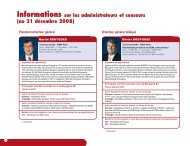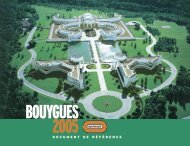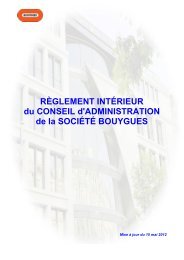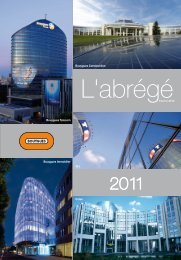Registration Document BOUYGUES
Registration Document BOUYGUES
Registration Document BOUYGUES
Create successful ePaper yourself
Turn your PDF publications into a flip-book with our unique Google optimized e-Paper software.
For several years, Colas has been committed to<br />
extending the use of warm asphalts and bitumen<br />
mixes, significantly reducing the temperatures at<br />
which products containing bitumen are applied<br />
and thus eliminating bitumen fume emissions<br />
almost entirely. It is seeking a similar commitment<br />
from the authorities and project owners to speed<br />
up this generalised use.<br />
There is no apparent obsolescence risk in terms<br />
of patents or processes. Colas has developed a<br />
research and development policy that allows for the<br />
constant renewal and upgrading of the company's<br />
technical know-how.<br />
General contract execution risk is relatively limited<br />
due to the large number of contracts and their low<br />
average value. However, some subsidiaries do<br />
work on large-scale projects. These major projects<br />
are subject to specific monitoring procedures, paying<br />
greater attention to specific issues: complexity,<br />
design, unforeseen circumstances (geological or<br />
archaeological constraints, making land available<br />
for construction), execution, delivery lead-times,<br />
etc. ISK, a Slovakian subsidiary, is currently<br />
experiencing difficulties in performing the works<br />
and honouring its obligations under a fixed-price<br />
contract for the construction and renovation of<br />
a power plant at Mochovce.<br />
The activities of Colas may also be sensitive to<br />
natural phenomena, particularly to the weather.<br />
Adverse weather conditions (rain, snow, frost)<br />
may generate additional costs to completion, and<br />
fixed costs erode margins more significantly during<br />
downtime.<br />
Commodities risk<br />
Colas is sensitive to the regularity of supplies of key<br />
commodities and to fluctuations in their cost. The<br />
main commodities involved are petroleum-based<br />
products in the road building business (bitumen,<br />
vehicle fuel, heating fuel, oil), together with other<br />
commodities such as steel, copper and aluminium<br />
in the security, signalling, waterproofing and rail<br />
businesses.<br />
The biggest risk relates to bitumen and other<br />
petroleum-based products.<br />
Supply chain risk<br />
Delays or stockouts in the supply chain may lead<br />
to direct and indirect cost overruns in the road<br />
building and waterproofing businesses. This is not<br />
a systematic risk, except in the case of a conflict<br />
and a total breakdown in petroleum supplies.<br />
This type of risk may affect a country, or more<br />
likely a region, over a variable period of time. At<br />
the beginning of 2011, the Kemaman refinery in<br />
Malaysia (operated by the Thai subsidiary, Tipco)<br />
had to stop production because it was unable to<br />
procure supplies of the type of crude oil suitable<br />
for the facility on acceptable purchase terms. This<br />
incurred additional unforeseen costs. Some years<br />
ago, Colas took steps to address this risk by setting<br />
up a group-level Bitumen unit, supported by<br />
similar units in some of the major regions where the<br />
company operates (e.g. North America) to improve<br />
supply chain capacity through bulk purchase<br />
agreements and imports. Over the years, Colas has<br />
also developed a bulk storage capacity, in France,<br />
Europe, the French overseas departments, in the<br />
Indian Ocean region and, on a larger scale, in<br />
North America. Storage capacities are substantial<br />
relative to bitumen consumption in each region.<br />
The policy of building up storage capacity is ongoing,<br />
with new capacity being added as opportunities<br />
arise to buy existing facilities or create new<br />
ones. The acquisition of Société de la Raffinerie<br />
de Dunkerque, which produces around 300,000<br />
tonnes of bitumen a year, is a significant factor in<br />
securing supplies for road building in France and<br />
Northern Europe. Possible, temporary closures<br />
of new refining plants in France (Berre, Petit-<br />
Couronne) increases the risk to bitumen supplies.<br />
Price fluctuation risk<br />
There have been significant fluctuations in bitumen<br />
prices for several years. A number of factors<br />
serve to limit the risk arising from these fluctuations,<br />
including the number and value of average<br />
contracts (which means that prices can often be<br />
reflected in the tender bid) and the fact that many<br />
contracts (in France and elsewhere) include revision<br />
or indexation clauses. Employees involved<br />
in contract negotiations are made aware of this<br />
issue so that it can be factored into the process.<br />
In some regions, it is possible to enter into supply<br />
contracts that fix prices at a guaranteed level for a<br />
specific period. For large-scale contracts, hedging<br />
strategies may be implemented on a case by case<br />
basis when orders are placed. In some of the Colas<br />
group's activities, such as sales of manufactured<br />
goods, rises in prices of bitumen and other petroleum-based<br />
products are passed on to customers<br />
to the extent that market conditions allow.<br />
Given these factors, it is not possible to quantify<br />
the sensitivity of operating profits to commodity<br />
price fluctuations: Colas is involved in thousands<br />
of contracts subject to varying degrees of legal<br />
protection and the extent of price rises varies from<br />
region to region.<br />
There is also an indirect risk that rises in the prices<br />
of these products might lead to a reduction in order<br />
volumes as customers react to higher prices for<br />
works and services.<br />
Risks relating to the activities of<br />
Société de la Raffinerie de Dunkerque<br />
(SRD)<br />
SRD, acquired in June 2010, is sensitive to fluctuations<br />
in commodity prices. The profit of a specialty<br />
product refinery is based on the difference between<br />
the sale price of the refined products (oil, paraffin<br />
wax, bitumen and fuel oil) and the price of the raw<br />
material inputs to the refining process (atmospheric<br />
residue, hydocrackate 1 , and feedstock). Refining<br />
margin reflects this price differential. The margin<br />
was satisfactory in the first half of 2011 but fell away<br />
in the last quarter due to the price rise in materials<br />
(linked to the price of heavy fuel oil) and price falls,<br />
particularly in base oils, as a result of the worsening<br />
economic crisis from September onwards and<br />
inventory drawdowns by customers.<br />
The supply/production/sale cycle is short and<br />
supply and sale contracts are drafted so as to<br />
reduce this risk. Input raw material purchases are<br />
handled by a specialist committee. Raw materials<br />
are used in production one month after purchase<br />
and the resulting products are sold that month or<br />
in the two months following. A hedging policy has<br />
been introduced to reduce this risk.<br />
As at 31 December 2011, these hedges represented<br />
132,000 barrels of Brent crude and 1,200<br />
tonnes of 1% fuel oil sold forward for a notional<br />
amount (volume multiplied by the forward price)<br />
of €11,368 million. In accounting terms, these<br />
qualify as cash flow hedges and their fair value as<br />
at 31 December 2011 had little impact (€0.104 million)<br />
on group equity.<br />
(1) Hydrocracking is an oil refining process wherein feedstock is cracked in the presence of hydrogen.<br />
<strong>BOUYGUES</strong> • 2011 <strong>Registration</strong> <strong>Document</strong> • RISK FACTORS • Business-specific risks • 142


